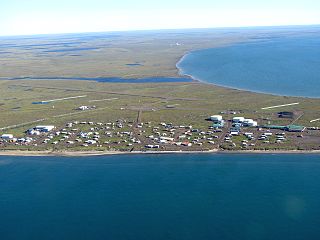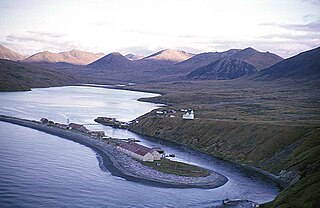 | |
| People | Yup'ik |
|---|---|
| Headquarters | Eek, Alaska, US |
| Government | |
| Chief | George Alexie |
The Native Village of Eek is a federally recognized Yup'ik Alaska Native tribal entity. [1]
 | |
| People | Yup'ik |
|---|---|
| Headquarters | Eek, Alaska, US |
| Government | |
| Chief | George Alexie |
The Native Village of Eek is a federally recognized Yup'ik Alaska Native tribal entity. [1]
The Native Village of Eek is headquartered in the city of Eek in the Bethel Census Area. [2]
As of 2005, the tribe had 278 enrolled citizens. [3]
In 2020, the village ordered a community-wide lock-down in response to the COVID-19 pandemic. [4]
In 2023, the Native Village of Eek and several other Alaska Native tribes joined a lawsuit against Donlin Gold, LLC, a mining corporation, alleging that the mine was a public health danger and did not have proper permits. The State of Alaska sided with the mining corporation. [5]

An American Indian reservation is an area of land held and governed by a U.S. federal government-recognized Native American tribal nation, whose government is autonomous, subject to regulations passed by the United States Congress and administered by the United States Bureau of Indian Affairs, and not to the U.S. state government in which it is located. Some of the country's 574 federally recognized tribes govern more than one of the 326 Indian reservations in the United States, while some share reservations, and others have no reservation at all. Historical piecemeal land allocations under the Dawes Act facilitated sales to non–Native Americans, resulting in some reservations becoming severely fragmented, with pieces of tribal and privately held land being treated as separate enclaves. This intersection of private and public real estate creates significant administrative, political, and legal difficulties.
The Native Village of Afognak is a federally recognized Alutiiq Alaska Native tribal entity, originally native to the island of Afognak.

In the United States, an American Indian tribe, Native American tribe, Alaska Native village, Indigenous tribe, or Tribal nation may be any current or historical tribe, band, or nation of Native Americans in the United States. Modern forms of these entities are often associated with land or territory of an Indian reservation. "Federally recognized Indian tribe" is a legal term in United States law with a specific meaning.
Southeast Alaska Regional Health Consortium (SEARHC) is a non-profit medical, dental, vision and mental health organization serving the health interests of the residents of Southeast Alaska.
Pauloff Harbor Village is a federally recognized Aleut Alaska Native tribal entity.
The Yakutat Tlingit Tribe is a federally recognized Tlingit Alaska Native tribal entity. Other federally recognized tribes with members of Tlingit heritage include the Central Council of the Tlingit & Haida Indian Tribes, the Douglas Indian Association, Skagway Village, the Organized Village of Kake, the Sitka Tribe of Alaska, and the Wrangell Cooperative Association.

Orutsararmiut Traditional Native Council (ONC) is the largest tribe in the Bethel, Alaska region. It is a federally recognized tribe and a governing body for the community of Bethel, Alaska.

The Native Village of Wales (Kiŋigin) is a federally recognized Inupiat Alaska Native tribal entity.
The Native Village of Unga is a federally recognized Aleut Alaska Native tribal entity.
The Qagan Tayagungin Tribe of Sand Point is a federally recognized Aleut Alaska Native tribal entity.

The Village of Wainwright is a federally recognized Iñupiat Alaska Native tribal entity.
The Native Village of Nuiqsut is a federally recognized Iñupiat Alaska Native tribal entity.
The Native Village of Point Hope is a federally recognized Iñupiat Alaska Native tribal entity.

The Native Village of Atqasuk is a federally recognized Iñupiat Alaska Native tribal entity.

The Native Village of Karluk is a federally recognized Alutiiq Alaska Native tribal entity.
The Native Village of Ouzinkie is a federally recognized Alutiiq Alaska Native tribal entity.
The Kaguyak Village is a federally recognized Alutiiq Alaska Native tribal entity.
The Native Village of Larsen Bay is a federally recognized Alutiiq Alaska Native tribal entity.